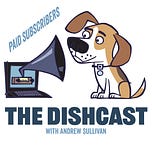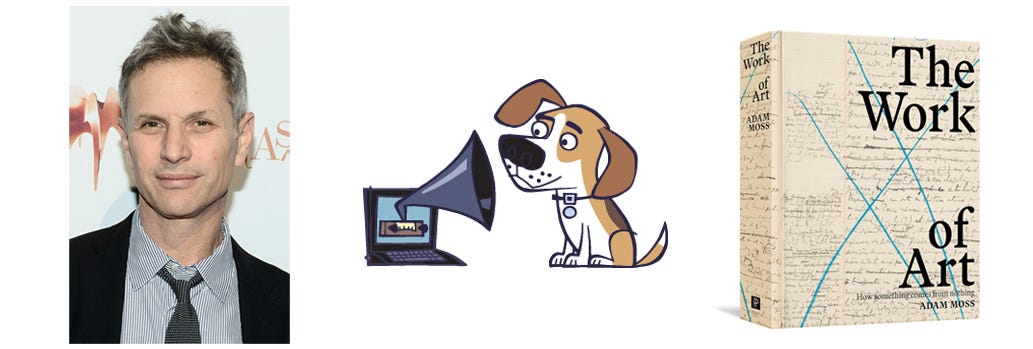Adam is the best magazine editor of my generation, and an old friend. From 2004 to 2019, he was the editor-in-chief of New York Magazine, and before that he edited the New York Times Magazine, and 7 Days — a weekly news magazine covering art and culture in NYC. His first book is The Work of Art: How Something Comes from Nothing.
You can listen right away in the audio player above (or on the right side of the player, click “Listen On” to add the Dishcast feed to your favorite podcast app). For two clips of our convo — on the bygone power of magazines, and the birth of the great and powerful performance artist, Dina Martina — pop over to our YouTube page.
Other topics: his upbringing on Long Island; fantasizing about NYC through the cosmopolitanism of magazines; being a “magazine junky extremely early”; the literary journalism of the ‘60s; Gay Talese; Joan Didion; Tom Wolfe; Adam’s early start at The Village Voice; 18-hour workdays; joining Rolling Stone then Esquire; commissioning Frank Rich’s groundbreaking piece on gay culture; the visual strength of mags; 7 Days “doomed from the start” because of a stock market crash; the NYT’s Joe Lelyveld hiring Adam to “make trouble” with creative disruption; Tina Brown; “the mix” of magazines like a dinner party; the psychodrama of writers clashing with colleagues; how the Internet killed magazines; the blogosphere; podcasting; the artist Cheryl Pope and her series on miscarriages; Tony Kushner’s Angels in America; when creation is tedious and painful; Leaves of Grass and its various versions; Montaigne’s essays; Pascal and the incompleteness of The Pensées; Amy Sillman painting over her beautiful work; Steven Sondheim; choreographer Twyla Tharp; poetry as the concentration of language and the deconstruction of how we speak; poets Marie Howe and Louise Gluck; the fiction writer George Saunders; how weed suppresses the ego; and Adam’s preternatural calm.
Browse the Dishcast archive for an episode you might enjoy (the first 102 are free in their entirety — subscribe to get everything else). Coming up: Oren Cass on Republicans moving left on class, Noah Smith on the economy, Bill Maher on everything, George Will on Trump and conservatism, Lionel Shriver on her new novel, Elizabeth Corey on Oakeshott, and the great Van Jones! Send any guest recs, dissents, and other comments to dish@andrewsullivan.com.
Last week’s episode with Johann Hari was a huge hit, driving many new subscriptions. A fan writes:
Thank you for the excellent episode! I listened to it twice, because I was trying to figure out how long people have to stay on Ozempic. Johann mentioned continuing the drug to maintain his weight loss. How long will he need to do that? Is it that once your sense of satiety is destroyed by manufactured food, you can’t ever get it back? Or can using the drug be a way to reset or relearn that instinct?
Johann didn’t mention the answer in the podcast he did with Bari Weiss, either. Do I need to buy the book to find out?
Johann responds:
The best evidence we have is that for most people, when they stop taking the drug, the weight comes back. The drugs are like blood pressure pills or statins — they work as long as you take them, then stop. Anecdotally, there seems to be some people who use them for a while to radically change their habits and build new habits, and then are able to sustain those changes when they stop — but they seem to be atypical. (But you should buy the book! There’s so much stuff I haven’t covered in the podcasts … )
Another listener has some advice:
I thought the episode was the most entertaining and funniest you have done so far. Just two silly cunts riffing for our benefit, on a subject I’m familiar with. I, too, am on Ozempic. It’s fantastic. Over the past year, I’ve lost 12 percent of my body weight and, more importantly, my A1C is way down. My doctor says I am once again pre-diabetic, but I prefer to think of myself as post-diabetic.
Here are three things you probably should know, but no one tells you before you start:
Be prepared to purchase a whole new wardrobe, or for your clothes to be taken in.
Like you, I lift weights at the gym a couple of times a week. Over the past year my top bench, deadlift, and squat have all decreased by about 20 percent. For every three pounds of fat, you loss about a pound of muscle. I look much better in clothes now, but no more preening in the gym.
This happened to me last weekend: I was biking in Central Park when a woman in a billowing sun dress just zipped past me. That was tough.
Another on the “fascinating discussion about Ozempic!”:
One topic I hear about a lot when people speak about this topic is the risk associated with going off the drug and how you can actually gain back more weight. I was surprised that you guys didn’t discuss that because that’s what a lot of people perceived to be the biggest risk. You said you just started the drug. How did you risk into the pros and cons overall?
I don’t think there are that many serious risks. If you stop Ozempic, the evidence is that you can gain back your weight, not that you’ll become even heavier. I don’t have a problem with permanent reliance on medications for resilient health problems. That’s how I haven’t died of AIDS, how I keep my blood pressure low, and my psyche from spiraling downwards. My issue is visceral fat, and I’m just going to see what happens. Everyone is different; I may stop if I get too skinny or get Jon Stewart face.
A medical doctor sends me “a note of caution should you decide to take Ozempic or Wegovy to lose your belly”:
I don’t think Johann mentioned that 40 percent of the weight loss will be muscle, which can be a significant problem. And when the drug is stopped, the weight regain is largely fat.
Haven’t heard of that last one. I don’t see why if you maintain a good weight-training regimen. My goal is to keep strength training, and retain as much muscle as I can. I’ve seen only a modest decline in weight in the, er, week that I’ve been on it. I’ve had some mild nausea. The biggest impact was on my breakfast. I make the same thing every day and suddenly could only eat half of it. I’ve tried to increase that this week, with minor success.
Another listener was bummed by the episode:
Johann was funny, charming and engaging. However, I don’t think a Dishcast has ever left me so depressed as this one. It feels like we have fully arrived in our dystopian future. We have sublimated seven million years of hominid evolution to arrive at a place where we fill our bodies with fake food and counteract the inevitable consequences with artificial meds. Just hook us up to machines. I suppose the disembodiment of our intellect into AI microchips is not far off.
I mean, seriously, why in God’s name would we opt for this path? If one is to accept the plausible premise that Johann describes, in which this relatively new phenomenon of widespread human obesity is a result, why are pills and a massive regulatory state the only solutions?
If the obesity epidemic were simply due to abundance of food and peoples’ inability to control their appetites, I might understand the argument for a pharmaceutical solution, since desire and willpower are very powerful and difficult to alter. But Johann makes a convincing argument — from experiments in rats to epidemiological data in humans — that “real” food does not produce the problems that manufactured food does. So, if eating non-processed food affects the same result as an expensive pill that has unstudied, unknown side-effects, why would anyone, including you, consider the latter?
What’s more, eating real food comes with a slew of additional benefits, such as a smaller environmental impact and the fact that it’s immensely more pleasurable (once you have withdrawn from the sugar/salt/hormonal high that processed food delivers). My family and I simply do not purchase, with any regularity, anything in a box or with an ingredient list more than three or four items. It is not a difficult thing to accomplish; we don’t need the government to enable this behavior; and both the preparation and consumption of fresh food brings substantial joy to our lives.
I grew up on processed food and fast food, but it was not a difficult thing to switch. In fact, I ate a McDonald’s hamburger not long ago — after many, many years without one — and it honestly tasted disgusting. Johann’s arguments ring true; I rarely overeat or feel the compulsion to do so. I suggest trying this road first, before adding another regular regimen of pharmaceutical manipulation into your life.
The terrible truth is: it’s just easier to take the shot. And humans will always take the easier path, if they have one.
Next up, a rather biting dissent:
Just a few words on the Johann episode, which left me speechless. Apologies for being rude, but you have no idea what food is, and you’re basically a victim of English food culture — or rather, the total lack thereof. Ultra-processed food is yummy? It looks so good? Andrew, it’s absolutely disgusting. The taste and mouthfeel are horrible, and it looks so bad that they have to photograph fakes for ads. Almost all of it is fat, salt and sugar (not coincidentally the cheapest ingredients available), with some mysterious chemical magic powder sprinkled in.
Obviously you have never regularly eaten real food and never will; it’s just too late; you have been conditioned to eat shite. I also remember hearing you say you always eat the same thing at restaurants, which is a little bit like saying that you always make love in the same position. You think that not being interested in food is a good thing, and that you’d rather work than eat? Would you say the same thing about sleep? I hope not, because it’s bonkers.
That is the root of your problem.
Listen to this episode with a 7-day free trial
Subscribe to The Weekly Dish to listen to this post and get 7 days of free access to the full post archives.












